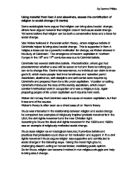Using the material from item A and elsewhere access the contribution of Marxism to our understanding of the role of education.
Using the material from item A and elsewhere access the contribution of Marxism to our understanding of the role of education.
Marxists have a critical view on the role of education. Capitalists society is a two class system, where ruling class exploit the working class.
Like it says in Item A, Althusser argues that the bourgeoisie use two apparatuses to control the working class. The first is Repressive state apparatus which controls the working class through force or threat, for example the police or the army. The next is Ideological state apparatus which control the ideas of the working class, making them think capitalism is a fair system, for example the education system, religion and especially in the media.
He also argues that education is an important ISA, which performs two functions. It reproduces class inequalities by making sure that the working class pupils fail and it also legitimates class inequalities by producing ideologies to hide its true purpose. Pupils learn that failure in school is their own fault.
Bowles and Gintis argue that the main function of education is to produce an obedient workforce which will accept the inequality. They also argue that the pupils that had the best obedience and are punctual tend to get the best grades, whilst the pupils that are creative and independent tend to get bad grades. They argue that there are parallels between school and work, they call this the correspondence principle, and these are the things in school that correspond to things in work. The correspondence principle works through the hidden curriculum, which are the things we learn in school that we don’t learn in lessons like authority and how to obey it. Bowles and Gintis argue that schools try to promote that they are meritocratic, but this is a myth as social class is the main factor. However by promoting that everyone can succeed schools can justify inequality, as the pupils and parents end up believing in the idea that the poor are dumb.









